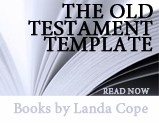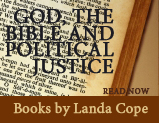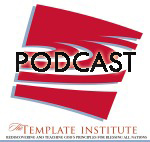Dio, Giustizia Bibbia e politici: Parte 2, Introduzione
Mosè e la legge prescrittivo
Il Modello per una Nazione
Dio stende la Sua rivelazione biblica di Se stesso in una linea temporale, iniziato con la creazione, Quell'uomo è decente in violenza globale, il diluvio, Quell'uomo è decente in violenza ancora e infine Abramo e Dio di strategia di usare una nazione per rivelare il suo cuore e la strategia per tutte le nazioni. Attraverso Abramo e la sua discendenza Dio porterà "la Legge,"Il suo pensiero su tutta la vita e" il suo Figlio,” His solution for redemption of all creation. La legge "benedire" coloro che vivono da essa, renderle libere dalla tirannia, e il Messia porterà liberazione dalla "schiavitù del peccato."
Tutta la Scrittura rinvia alle e sviluppare le Leggi di Mosè, il Pentateuco. In Matteo, Gesù chiarisce che la legge ei profeti costruiscono le basi per il suo messaggio e le sue azioni:
17″Non pensate che io sia venuto ad abolire la Legge oi Profeti;; Io non sono venuto per abolire, ma per dare compimento. 18Vi dico la verità, fino al cielo e la terra, non la più piccola lettera, non ultimo tratto di penna, sarà o un apice della legge passerà senza che tutto sia adempiuto. 19Chi dunque avrà violato uno di questi minimi precetti e insegnerà agli uomini a fare altrettanto, sarà considerato minimo nel regno dei cieli, ma chi pratica e insegna questi comandi, sarà considerato grande nel regno dei cieli. 20Poiché io vi dico che se la vostra giustizia non supera quella dei farisei ei dottori della legge, certamente non entrerete nel regno dei cieli.
If our thinking does not build on the values of the Law then we cannot understand where Jesus is taking us with His message. Lui non ci sta dando una simpatica, senza spina dorsale, sentirsi buon brodo. He is actually raising the requirements of the Law to righteousness beyond what Moses could have comprehended. Noi non reinterpretare l'Antico Testamento con il Nuovo, né il nuovo con il vecchio, ma vederli come un migliaio di linea quattro anni di pensiero che Dio sta costruendo. It is a continuum of ideas that begin in Genesis and build towards His ultimate return and what we are to do in the mean time.
It is impossible to define “justice or mercy” without the Old Testament definition of “justice and mercy.” It is impossible to define “political justice” without God’s definition in the Old Testament. Questi concetti non significano ciò che vogliamo loro di dire a causa dei nostri regali o di personalità, cultura o volte. Essi significare qualcosa di molto specifico a Dio e solo Lui ha il diritto di definirli per noi. If we seek to be God’s ambassadors them we must represent His policies not the current policies of the world or even in some cases the thinking of Christians in our age.
La legge prescrittiva / La Legge Storico
La legge è una frase all-inclusive per entrambe le leggi prescrittive, come ad esempio i dieci comandamenti, and the Law applied in the history of Israel. Remember the “knowing” in the Hebrew concept was being able to do as well as repeat. So the test of Israel’s understanding of the Law is in their application of the Law to the times they live in. God corrects them as they take action and reveal their understanding of what they think He has said. So the historical books from Joshua through Ester are as important to our understanding of the five books of Moses as the five books are.
La Legge è dato in due forme, the prescriptive and the historical. The prescriptive gives us the dos and don’ts while the historical gives us the application of the Law in Jewish history and the fruit of their interpretation of the Law gives us an understanding of whether they understand God’s thinking by producing “good” or “bad” consequences. The Law includes what God said in the first place, what the Jews did and what God had to say about what they did. God clarifies the “meaning” of the Law through the history of its application, first by the Jews and later by the Gentile nations. And so we are still today proving by our choices the consequences of applying or not applying the values of God in our communities.
The Prophets are sent by God to tell the Jews why they are going though the circumstances they are experiencing as a nation. Referring back to the Law of Moses, Profeti sottolineano quello che gli ebrei hanno fatto, how it compares to what God said and why they are or will experience the consequences of those choices. The Prophets point out what they must do, basato sulla Legge, se vogliono fermare o invertire le conseguenze di quelle scelte e di ritornare ad uno stato di benedizione di Dio.
The Messiah comes saying that He has come to build on the Law and the Prophets not to eliminate them. He has come to reveal and secure “righteousness” for us, which the Law was never going to be able to produce. Because no matter how much we obey the Law, peccato continua a squalificare noi dal Regno, anche mentre ci benedizione sulla terra.
For our purposes in this book we will look at the prescriptive and historical separately to try to draw out what is being emphasized in each. But for the development of our thinking we must see them as integrated. So in effect we “dissect” to analyze but must put them back together to find application. Per esempio, the prescriptive law says adultery is to be punishable by death. But historically this death penalty is not applied to David when he commits adultery with Bathsheba. Perché? Did they just not apply the Law? Oppure, non c'era più per "legge" di un semplice divieto? Was the right of the people to ratify or change civil law part of the values “the Law” secured?
Se dividiamo la legge prescrittiva fuori dal centro storico e poi dividere per i valori che essa difende, potrete isolare cinque valori di Dio rafforza in e attraverso tutti i domini e tutta la vita:
- La vita è sacra
- Il mondo materiale è reale e buono e essenziale per tutta la vita
- Le parole hanno il potere e noi siamo responsabili per il loro
- Tutto deve e si può utilizzare
- Ogni pensiero che ci allontana dai valori di Dio comincerà a distruggere (non benedirà) noi.
La legge prescrittiva e storico stabilisce quattro istituti di dati da Dio con la definizione di scopo, autorità e confini a tale autorità,:
- L'individuo
- La famiglia
- Governo civile
- La Chiesa istituzionale
Ognuna di queste "istituzioni" è dato un tipo di autorità, Non tutta l'autorità, pensionanti, diritti, freedoms and responsibilities. They lay the foundation for the values base on civil law. These values do not perfect human beings or society but, al livello cui sono stabiliti e rafforzati, they will create and sustain a more blessed society. These values and institutions when applied reveal God to the human community. They work with the cross to reveal Christ the King but they do not substitute for forgiveness and salvation through Jesus. They reveal the Kingdom that is coming but they cannot perfect that Kingdom on earth. Established and used properly these values produce a higher quality of life in all areas of life but they will not finally perfect man or creation.
Nella sua serie sulla Costituzione americana, Fred amichevole della Columbia University ed ex presidente della CBS News ha definito questi (di essere guardato in su)...
We now have four assumptions on which God builds all His thinking. Five values that are essential to uphold if these assumptions are true, e quattro le autorità istituzionali che Dio ci dà per preservare e perpetuare queste verità e valori ai fini della benedizione.
Queste realtà bibliche istituire una "tensione" della libertà, diritti e responsabilità che devono essere mantenute al fine di costruire individui sani, families and communities. They cannot be “balanced” they must be mutually maintained. If we error in one direction or the other we distort God’s plan. God has made the individual free and sovereign. Ma, dal momento che è vero per ogni individuo, there are limits to the freedom of any single individual. In order for every individual to be free there have to be limits to all of our freedoms. Who has the right and responsibility to create and sustain those boundaries? God has created the family as the authority for and over children. The authority of parents is loving their children. If they are trying to murder their children they are in violation of the sacredness and rights of the individual child’s life. I have the freedom to believe what I live. Do I have the freedom to practice that freedom anywhere anytime or any place? If I believe in human sacrifice for my blessing do I have a right to do it? Or is this an abuse of the sacrifice’s rights? Do we have rights as communities? If most of us agree that murder should be illegal, abbiamo il diritto di rendere illegale? Are there boarders to the rights of the community? How do we secure minorities rights to action, educazione dei figli e la fede senza distruggere i diritti delle comunità?
In tutte queste cose noi chiediamo le domande:
- Chi ha il diritto di governare i molti?
- Da dove prendono l'autorità?
- Qual è il modo in cui l'autorità deve essere eseguito?
- Che cosa significa che l'autorità dispone dei diritti sopra?
- Quali sono i limiti di tale autorità?
Ogni sistema di governance ha risposte a queste domande, or is working on them. But are they Biblical answers? We can know what God says about each question. We can know, in un dato momento, where our nations laws and system of governance are blessed or in danger. This is the Biblical Template, ma dobbiamo essere disposti a scambiare il pensiero del mondo, anche quando è stato chiamato "cristiano" e sostituirlo con il pensiero di Dio, anche quando questo si chiama "mondano".







